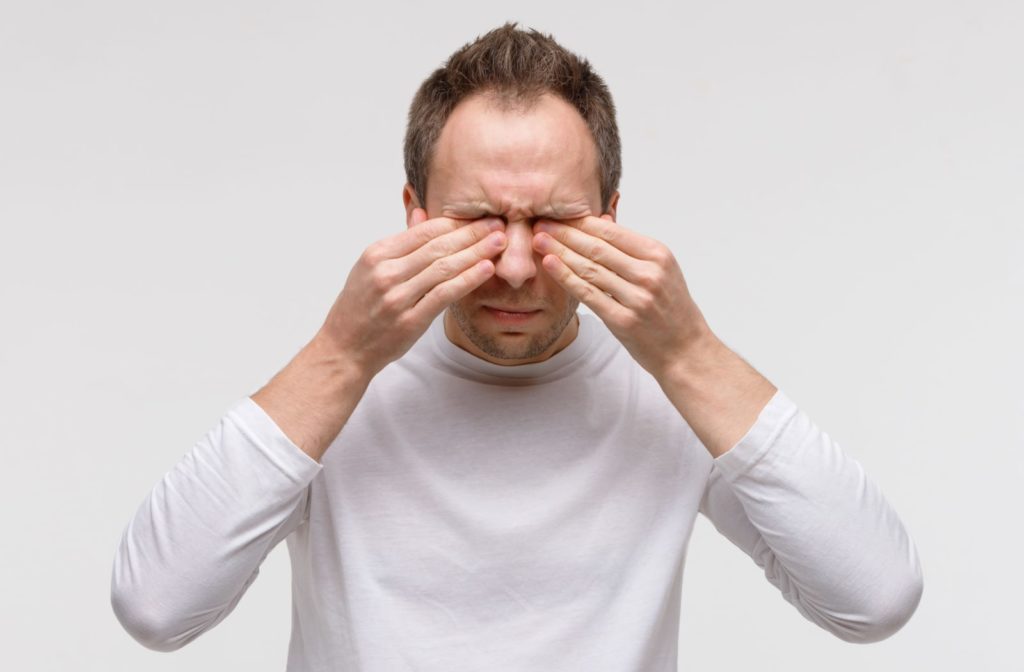We’ve all experienced the occasional dry eye, maybe from a dry climate or air conditioning. But when dry eyes persist, your eyes can feel tired, gritty, and just plain uncomfortable all day long.
Dry eyes can lead to blurry vision too. When you lack enough quality tears to maintain your tear film, your cornea’s ability to focus light can change, resulting in blurry vision.
Maintaining your eye health and vision is possible with regular eye exams and dry eye treatment. We can help determine the underlying cause of your dry eyes and recommend personalized treatment options to help manage symptoms like blurry vision.
What Causes Dry Eyes?
Your eyes are protected and lubricated by a thin layer of tears that keep them moist and comfortable. This tear film is a mixture of water, oil, and mucus that work together to maintain your eye health by:
- Protecting your eyes from dirt and foreign debris
- Stopping tears from evaporating too quickly
- Creating a smooth eye surface for clear vision
With an imbalance of these components and an unstable tear film, your tear production may not be sufficient enough or a high enough quality to keep your eyes moist. As a result, your eyes can become dry, leaving you with blurry vision and other symptoms.
Other symptoms of dry eye can include:
- Stinging or burning sensations
- A feeling like something’s in your eye
- Red eyes
- Light sensitivity
- Watery eyes
- Tired eyes
The Link Between Dry Eyes & Blurry Vision
There are several ways that dry eyes can cause blurry vision, but it’s important to remember that dry eye disease is not the only cause of blurry vision.
Frequent or constant blurry vision could also be a sign of other underlying eye conditions, so it’s important to speak with your eye doctor when your notice changes to your sight or eyes.
Unstable Tear Film
Your eyes rely on healthy, sufficient tears to support your vision as light passes through your cornea—the clear, dome-shaped outer layer of the eye. When light first enters your eyes, your cornea helps it focus on your retina—the light-sensitive tissue at the back of your eye—to send signals to your brain.
For a clear image, your cornea must remain smooth and transparent. When your eyes are dry, the tear film on your cornea can become uneven and unstable. As a result, light rays passing through this distorted tear film can be scattered—rather than sharply focused on the retina—and you may experience blurry vision.
Watery Eyes
As contrary as it seems, dry eye disease can also cause watery eyes. In response to the dryness and irritation, and despite poor quality tears, your tear glands can produce excess reflex tears that can cause watery eyes—which may affect your vision.
Eye Strain
Other causes of dry eyes that can result in blurry vision include digital eye strain and blinking less. Spending long hours staring at screens, reading in poor lighting, or even driving for extended periods of time can lead to eye strain and temporary blurry vision.
What Are the Treatments for Dry Eyes & Blurry Vision?
The effects of dry eye disease can go beyond moments of temporary discomfort. Leaving dry eyes untreated can affect your long-term ocular health. Chronic dry eyes may lead to inflammation, corneal damage, and declining vision.
Treatment for dry eyes involves more than just managing your symptoms. Treating the underlying cause can help address long-term issues and provide lasting relief, which usually starts with a comprehensive eye exam.
Dry eye treatment can include:
- Medicated eye drops, such as RESTASIS and Xiidra, which can support adequate eye hydration.
- Punctal plugs, which can prevent tear drainage and protect the eye’s lubrication.
- Serum tears, which use protein from your blood added to artificial tears for dry eye symptom relief.
- Heat masks, which can provide relief from chronic dry eye symptoms and can be paired with other treatments.
- Specialty contact lenses, such as scleral contacts, which can provide more water content and oxygen to prevent dry eyes and blurry vision.
Tips to Prevent Blurry Vision from Dry Eyes
Sometimes, the underlying causes of dry eyes can make it harder to prevent your symptoms. However, there are a few habits you can practice to help keep your eyes moist and your vision clear.
Here are some handy tips and lifestyle changes to incorporate:
- Blink regularly: Blinking helps spread tears evenly across your eyes. Remember to blink consciously, especially with visually demanding tasks, such as reading or when focusing on screens.
- Limit your screen time: Take regular breaks when spending long hours in front of screens to reduce eye strain.
- Stay hydrated: Drink plenty of water to maintain your overall hydration and support your tear production.
- Adjust your indoor air: Use a humidifier in dry indoor environments and avoid forced air from air conditioning and heating systems.
- Avoid dry outdoor environments: Both smoke and wind can dry your eyes.
- Wear protective eyewear: Wrap-around sunglasses and protective goggles can shield your eyes outdoors.
Support for Healthy Eyes & Vision in Cincinnati & Loveland
Dry eyes can cause blurry vision, but blurry vision can also be caused by other conditions. When you visit us, we can find the underlying causes of blurry vision to help take care of your eyes and maintain your vision.
Don’t let dry eyes or blurry vision affect your quality of life. Book an appointment with 2020 Eyecare Ohio for an eye and vision assessment. With support from our experienced eye doctors, you can find dry eye relief and take steps toward supporting your healthy, happy eyes.



